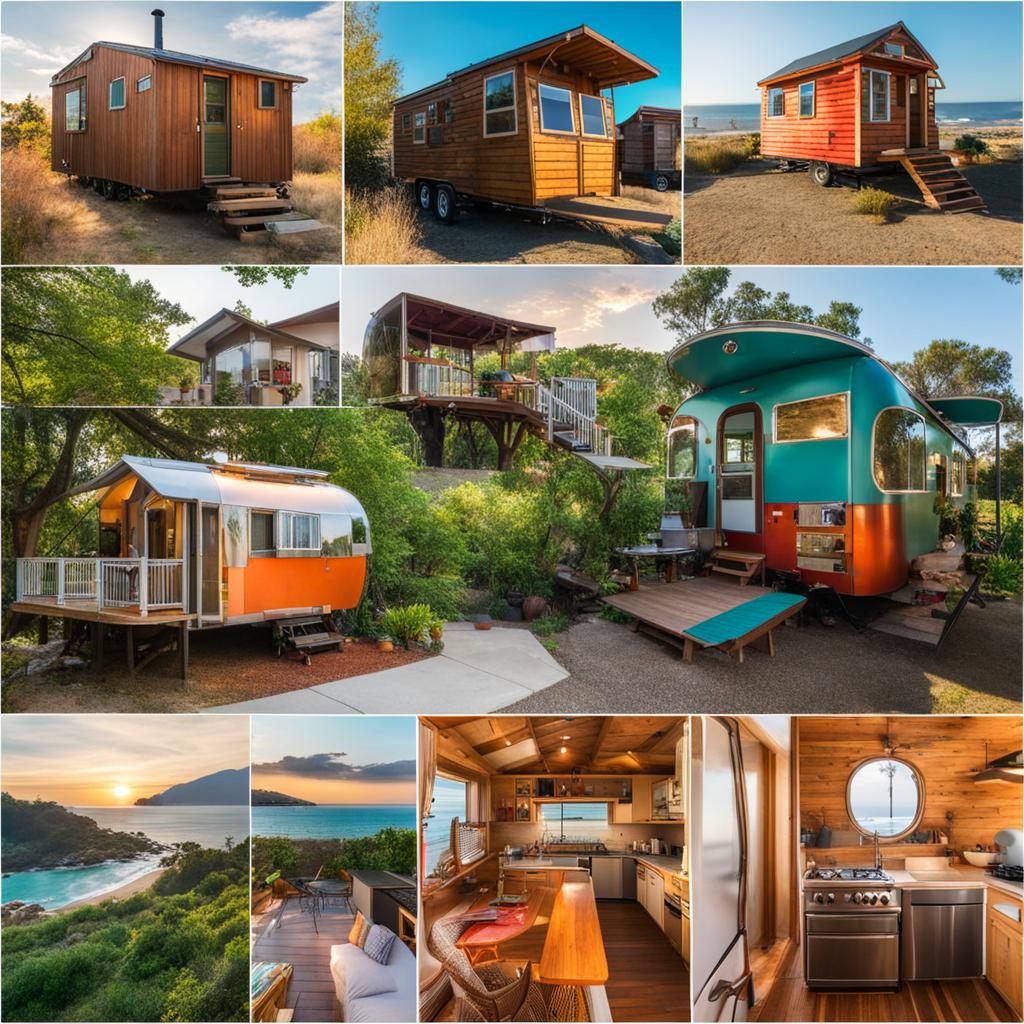By now, you’ve probably heard of Airbnb. You may have even stayed in one. Lately, millions of people are turning to Airbnbs as a low-cost and more comfortable alternative to hotels. If you love the concept and want to take it a step further, I’m going to tell you exactly how to become an Airbnb host so you can make a decent side income.
Key Takeaways:
- Learn the step-by-step process to become an Airbnb host
- Understand the different types of Airbnb rentals you can offer
- Consider the legal requirements, pricing strategies, and tax obligations
- Discover tips for maximizing your profits on an Airbnb rental
- Report your rental income properly to comply with tax regulations
What is Airbnb?
If you aren’t familiar yet, Airbnb is a platform for vacation rentals. Qualified hosts can list their property for rent on the platform, manage the rental, and get paid all on the Airbnb platform. The Airbnb platform makes sharing your property easy, profitable, and safe. To make the most money on Airbnb, you want to become a top-rated host.
Types of Airbnb Rentals
When it comes to listing your property on Airbnb, you have the flexibility to offer different types of rentals based on your preferences and available space. Whether you want to rent out your entire home, a private room, or a shared room, Airbnb provides options to suit your hosting style.
Entire Place Rentals
If you have an entire home or apartment that you’d like to rent out, you can list it as an “entire place” on Airbnb. This means that the renters will have exclusive access to the entire property during their stay. It’s a great option if you have a separate guest house or an extra unit on your property.
Private Room Rentals
If you have extra rooms in your home that you’d like to rent, you can list them as private rooms on Airbnb. In this type of rental, the guests will have their own private space for sleeping, but they may share common areas such as the kitchen, living room, or bathroom with you or other guests. It’s a good option if you’re comfortable sharing your space with others.
Shared Room Rentals
For those who are open to hosting more budget-conscious travelers or have limited space, you can list a shared room on Airbnb. In a shared room rental, guests will be sharing the same sleeping space with others, such as a dormitory-style setup or a room with multiple beds. It’s an economical option for travelers looking for affordable accommodations.
Remember, the type of rental you offer will depend on your property, your personal preferences, and the demand in your area. Consider factors such as the size of your space, your comfort level with sharing, and the target market you want to attract.

| Rental Type | Description |
|---|---|
| Entire Place | The renters have exclusive access to the entire property. |
| Private Room | Guests have their own private sleeping space but may share common areas. |
| Shared Room | Guests share the same sleeping space with others. |
Factors to Consider Before Becoming an Airbnb Host
As you embark on your journey to become an Airbnb host, there are several crucial factors you need to consider. These factors include understanding the legal requirements for Airbnb hosts in your area, setting the right pricing for your rental, and being aware of the taxes you may owe as an Airbnb host.
Before listing your property on Airbnb, it’s essential to research and familiarize yourself with the local regulations concerning short-term rentals. Each city or municipality may have specific rules and requirements that you must adhere to as a host. By understanding and complying with these regulations, you can ensure a smooth hosting experience and avoid any legal issues or penalties.
Pricing your Airbnb rental is another critical factor to consider. To determine the right price for your rental, take into account factors such as demand, seasonality, location, property size, and amenities offered. Additionally, consider any property premiums you may charge for unique features or services. It’s also crucial to factor in your desired profits and any cleaning fees you may incur.
Furthermore, as an Airbnb host, you need to be aware of the tax implications of hosting guests. Rental income generated through Airbnb is generally considered taxable. It’s important to understand the tax laws in your jurisdiction and ensure compliance with local tax regulations. Consider consulting with a tax professional to determine the specific tax obligations you may have as an Airbnb host.

To summarize, before becoming an Airbnb host, it’s vital to research and understand the legal requirements in your area, carefully price your rental property, and be knowledgeable about the applicable taxes. By considering these factors, you can ensure a successful and rewarding experience as an Airbnb host.
How to Become an Airbnb Host in 7 Steps
Ready to start your journey as an Airbnb host? Follow these 7 steps to get started:
- Sign up on Airbnb: Visit the Airbnb website or download the app and create your host account by providing the required information.
- Create a compelling listing: Take high-quality photos of your property, write an engaging description, and set competitive pricing to attract potential guests.
- Set house rules: Determine rules for your guests regarding check-in/check-out times, smoking, pets, parties, and any other important regulations.
- Prepare your space: Ensure your property is clean, comfortable, and equipped with essential amenities for a pleasant guest experience.
- Manage your calendar: Keep your availability up-to-date on the Airbnb platform to avoid double bookings and maintain a smooth hosting schedule.
- Communicate effectively: Respond promptly to guest inquiries, address their concerns, and provide clear instructions for check-in and check-out.
- Deliver exceptional hospitality: Welcome guests warmly, provide local insights and recommendations, and go the extra mile to ensure their stay is memorable.
By following these steps, you’ll be well on your way to becoming a successful Airbnb host. Embrace the opportunity to connect with guests from around the world and earn income by sharing your unique space!
Quote:
“Becoming an Airbnb host has been a game-changer for me. It allows me to meet fascinating people, showcase my hospitality skills, and earn extra income. It’s a win-win situation!” – Sarah, Airbnb host

How Airbnb Hosts Get Paid
As an Airbnb host, receiving payment for your rental property is a straightforward and seamless process. Airbnb takes care of collecting the money from the renter upfront, providing convenience and security for both hosts and guests. Here’s how the Airbnb payment process works:
The Payment Timeline
When someone books your property on Airbnb, the platform holds onto the funds until 24 hours after the renters check into your property. This allows time for the guest to confirm their arrival and ensure a smooth check-in process. After this 24-hour period, you’ll receive the payment for the rental.
Payment Methods
Once the payment is released, Airbnb offers two convenient payment methods for hosts: PayPal or direct deposit. You can choose the option that best suits your preferences and financial needs. PayPal is a widely used online payment system that provides secure transactions, while direct deposit allows the funds to be transferred directly to your bank account.
Airbnb Service Fee
It’s important to note that Airbnb retains a service fee from each booking. This fee typically ranges from 3% to 5% of the listing price, depending on various factors. The service fee helps Airbnb cover the costs of operating the platform, providing customer support, and offering valuable services to both hosts and guests.
Overall, the payment process as an Airbnb host is designed to be simple and efficient, allowing you to focus on hosting and providing a great experience for your guests. With secure payment methods and transparent fees, Airbnb ensures that hosts receive their earnings in a timely and hassle-free manner.
Maximizing Your Profits on an Airbnb Rental
When it comes to hosting on Airbnb, maximizing your profits is key. Here are some valuable tips to help you increase your Airbnb rental income and maximize your occupancy rates:
- Set Competitive Pricing: Research similar rentals in your area and set your prices competitively. Consider factors such as location, amenities, and seasonality when determining your rates.
- Create an Appealing Listing: Make your listing stand out by highlighting the unique features of your property. Use high-quality photos, write a compelling description, and emphasize the benefits of staying at your place.
- Optimize Your Airbnb Profile: Complete your profile with accurate and detailed information. Add a friendly profile photo and provide a welcoming description to build trust with potential guests.
- Offer Extra Amenities: Enhance the guest experience by offering additional amenities such as Wi-Fi, parking, laundry facilities, or complimentary breakfast. These little extras can make your listing more attractive to potential guests.
- Provide Stellar Customer Service: Respond promptly to guest inquiries and be attentive to their needs throughout their stay. Positive reviews and word-of-mouth recommendations can greatly increase your occupancy rates.
- Ensure a Clean and Well-Maintained Property: A clean and well-maintained property not only enhances the guest experience but also increases the likelihood of positive reviews. Consider hiring a professional cleaner or invest in high-quality cleaning supplies.
- Adapt to Guest Feedback: Pay attention to guest feedback and make necessary improvements to address any concerns or suggestions. Continuously striving to enhance the guest experience will result in increased bookings and higher profits.
By implementing these tips, you can maximize your profits on Airbnb and increase your rental income. Remember, providing exceptional service and creating a memorable experience for your guests are key factors in achieving long-term success as an Airbnb host.

Don’t Forget to Report Your Income
As an Airbnb host, it’s crucial to understand the tax obligations associated with reporting your rental income. The income you earn from your Airbnb rentals is taxable, just like any other source of income. Failing to report your rental income can result in penalties and other legal consequences.
To ensure compliance with tax regulations, follow these steps:
- Keep accurate records: Maintain detailed records of your Airbnb rental income and expenses. This includes rental receipts, repair costs, cleaning fees, and any other relevant expenses.
- Report your rental income: Include your Airbnb rental income on your tax return. The specific form you use may depend on your business structure (individual, partnership, or corporation). Consult with a tax professional or utilize tax software to accurately report your income.
- Declare deductions: Take advantage of deductions and credits available to Airbnb hosts. This may include deductions for cleaning fees, maintenance costs, property taxes, and mortgage interest payments. Again, consult with a tax professional for guidance.
- Understand local tax regulations: In addition to federal taxes, be aware of any local tax obligations for Airbnb hosts. Some cities or states may require hosts to collect and remit occupancy taxes or obtain specific permits or licenses.
“Properly reporting your Airbnb rental income not only ensures compliance with tax laws but also provides peace of mind and protects you from potential penalties and audits.” – Rebecca Johnson, Certified Public Accountant
Remember, tax obligations for Airbnb hosts can be complex, and they may vary depending on your location and individual circumstances. Consulting with a qualified tax professional will help you navigate the intricacies of reporting your rental income and ensure that you take full advantage of any available deductions.
| Tax Reporting Tips for Airbnb Hosts | Benefits |
|---|---|
| Consult a tax professional | Ensures accurate reporting and maximizes deductions |
| Keep detailed records | Helps substantiate income, expenses, and deductions |
| Understand local tax regulations | Avoids penalties for non-compliance |
| Take advantage of available deductions and credits | Reduces taxable income and increases potential refunds |
Final Thoughts on Becoming an Airbnb Host
Becoming an Airbnb host can be an exciting and rewarding endeavor. Not only can it provide you with a lucrative side income, but it also offers a unique hosting experience that allows you to meet people from all around the world. However, before diving into the world of Airbnb hosting, there are certain considerations that you should keep in mind.
Legal Requirements and Regulations
First and foremost, it is essential to familiarize yourself with the legal requirements and regulations that apply to Airbnb hosting in your area. Different cities and regions may have specific rules and restrictions surrounding short-term rentals. Ensure that you understand and comply with all applicable laws to avoid any legal issues or penalties.
Pricing Strategies
Pricing your Airbnb rental is an important aspect that can significantly impact your success as a host. Take into account factors such as the location, demand, seasonality, and comparable listings in your area. Striking the right balance between affordability and profitability is key to attracting guests while maximizing your earnings.
Tax Implications
As an Airbnb host, it is crucial to be aware of the tax implications of your hosting income. Depending on your jurisdiction, you may be required to report your earnings and pay taxes on them. Consult with a tax professional to ensure that you understand your obligations and can properly account for your Airbnb income.
By carefully considering these factors and taking the time to plan and prepare, you can position yourself as a successful Airbnb host. Utilize the steps outlined in this guide, implement tips for maximizing profits, and provide a memorable guest experience to set yourself up for Airbnb hosting success.
| Considerations for Becoming an Airbnb Host | Benefits | Challenges |
|---|---|---|
| Legal Requirements | – Opportunity to generate income from your property – Flexibility in hosting and scheduling |
– Need to comply with local regulations and licensing – Potential legal liabilities |
| Pricing Strategies | – Ability to set your own rental rates – Potential for high occupancy and increased revenue |
– Competition from other hosts and listings – Balancing affordability and profitability |
| Tax Implications | – Additional income source – Tax deductions for expenses related to hosting |
– Complex tax reporting and calculations – Potential for increased tax liability |
Considering these essential factors and making informed decisions will set you on the path to becoming a successful Airbnb host. By providing an outstanding guest experience, staying compliant with regulations, and continually refining your hosting strategies, you can create a profitable and enjoyable hosting venture.
Conclusion
Taking the leap to become an Airbnb host can be a rewarding experience, both financially and personally. By following the 7 steps outlined in this guide, you can start your journey to becoming a successful Airbnb host.
First, familiarize yourself with the platform and understand what it takes to be a top-rated host. Next, decide on the type of rental you want to offer – whether it’s an entire place, a private room, or a shared room.
Before diving in, make sure to carefully consider factors such as legal requirements, pricing strategies, and tax obligations. Research the local regulations for short-term rentals, set an appropriate rental price based on demand and property premiums, and consult a tax professional to ensure compliance.
Once you’re ready, follow the step-by-step process to create a compelling listing, attract guests, and manage bookings effectively. Maximize your profits by providing a positive guest experience, optimizing your listing, and implementing strategies to increase occupancy rates.
With these considerations in mind, you’re well-equipped to begin your journey as an Airbnb host. Best of luck in your new venture!
FAQ
What is Airbnb?
Airbnb is a platform for vacation rentals where qualified hosts can list their property for rent, manage the rental process, and get paid through the platform. It provides an easy, profitable, and safe way for hosts to share their properties with travelers.
What types of Airbnb rentals are available?
There are three types of Airbnb rentals: entire place rentals, private room rentals, and shared room rentals. Entire place rentals give renters exclusive access to the entire property. Private room rentals involve sharing common spaces with the host or other guests. Shared room rentals mean renters will share the room with others.
What factors should I consider before becoming an Airbnb host?
Before becoming an Airbnb host, you should consider the legal requirements in your area for short-term rentals, determine how to price your rental appropriately, and understand the tax obligations that may apply to your rental income.
How can I become an Airbnb host in 7 steps?
To become an Airbnb host, follow these 7 steps: 1. Create an Airbnb account, 2. Set up your listing, 3. Determine your pricing strategy, 4. Create an appealing listing, 5. Be responsive to inquiries and bookings, 6. Provide a great guest experience, and 7. Optimize your listing to become a superhost.
How do Airbnb hosts get paid?
Airbnb collects the money from the renter upfront and holds onto the funds until 24 hours after the renters check into your property. At that point, you’ll receive the money either through PayPal or direct deposit. Airbnb typically keeps a portion of the listing price as a fee.
How can I maximize my profits on an Airbnb rental?
To maximize your profits on an Airbnb rental, consider the following tips:
– Set competitive and accurate pricing
– Offer added value or unique selling points
– Keep your listing description and photos updated
– Provide exceptional hospitality and guest experience
– Optimize your listing for search ranking and visibility
What should I do about reporting my income as an Airbnb host?
The income you earn from your Airbnb rentals is taxable. Be sure to report your rental income to the appropriate tax authorities and keep track of any expenses related to your rental property. Consult a tax professional for guidance on your specific tax obligations as an Airbnb host.
What are some final thoughts on becoming an Airbnb host?
Becoming an Airbnb host can provide a lucrative side income and a unique hosting experience. However, it’s important to carefully consider the legal requirements, pricing strategies, and tax implications before getting started. By following the steps outlined in this guide and implementing tips for maximizing profits, you can become a successful Airbnb host.
Our Friends
- https://therealist.io/airbnb-setup-checklist/
- https://millennialmoneyman.com/how-to-become-an-airbnb-host/
- https://www.airbnb.com/resources/hosting-homes/a/how-to-become-a-host-on-airbnb-490
Money posts:
 Rental Property Due Diligence Checklist (2024)
Rental Property Due Diligence Checklist (2024)
 Neighbor Review | A Legit & Easy Way to Make Passive Income in 2024
Neighbor Review | A Legit & Easy Way to Make Passive Income in 2024
 How to Invest in Rental Properties: A 4-Step Guide
How to Invest in Rental Properties: A 4-Step Guide
 How Much Can I Rent My House For in [Year]: Expert Rental Valuation Tips
How Much Can I Rent My House For in [Year]: Expert Rental Valuation Tips
 Rooftop Review | Invest in Single Family Rental
Rooftop Review | Invest in Single Family Rental
 Investing in Rental Property for Beginners: A Comprehensive Guide
Investing in Rental Property for Beginners: A Comprehensive Guide
 How to Buy an Investment Property
How to Buy an Investment Property
 12 Tips for Buying Your First Rental Property (2024)
12 Tips for Buying Your First Rental Property (2024)

